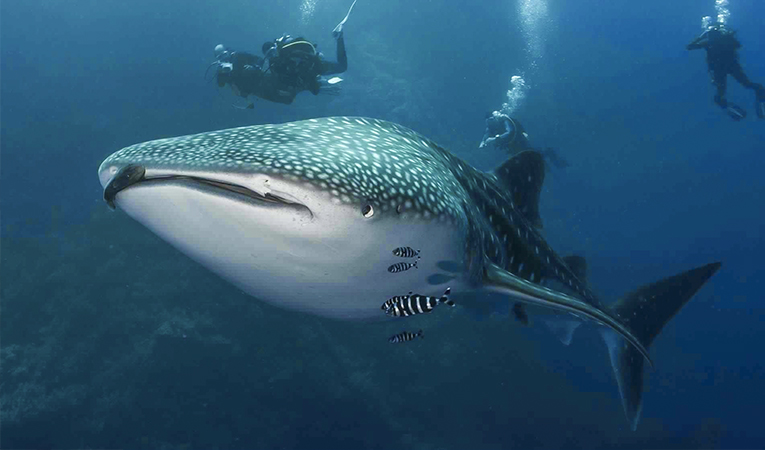A
number of divers and hunters have been spotted in the past two days, the
largest shark in the world, the so-called "Pisces" or "Whale
Shark", known as "Bahloul" in the waters of Hurghada and Marsa
Alam. Mr.
Hassan
al-Tayeb, chairman of the Marine Rescue and Environmental Protection Society,
said that a group of fishermen spotted the appearance of the whale shark in
Hurghada.
Mr.
Ahmed Ghalab, director of the Red Sea reserves, said that the appearance of
"Bahloul” has appeared several times in three different areas across the
Red Sea area, including Port Ghalib, al-Fanous area, and between the two
islands of Geftoun, preceded only two days ago the emergence of another area in
the reef "Feniston" in the city of Marsa Alam, south of the province,
and has appeared several times in Hurghada and Marsa Alam during the past
years. This shark comes from the Indian Ocean through Bab el-Mandab to the Red
Sea, according to Ghallab.
He added that this spices is a rare species of peaceful sharks, or so-called "whale shark". It is considered one of the largest species of sharks found in the sea. It is 12 meters long and weighs about 30 tons. Fish and algae, but it is dealt with in huge quantities and is located in most seas of the world, including the Red Sea. The rare animal is called a Bahloul by locals due to the white dotted pattern on its skin. It ranges between five to six meters long and has no teeth. The whale shark owes its name to its gargantuan size, with the largest adults reaching up to 13 meters in length. The species is distinguished by the white, polkadot-like pattern on its skin, interspersed with pale stripes. They feed mainly on plant plankton.
Guidelines were published on how to deal with the Bahloul shark, by the Red Sea Reserves management on its official Facebook page. The statement warned against attempts to touch or chase the shark, or forcing it to change direction. The statement instructed that people should keep three to four meters between themselves and the shark. Camera flashes may also aggravateit. The shark poses no threat to those who do not disturb, said Ghallab.
Specialists
in marine sciences consider the appearance of Bahloul to be a rare
environmental event which demonstrates the success of the protection of the Red
Sea's marine environment, and Egypt's commitment to international agreements in
this regard, leading to the settlement of the whale shark in the Red Sea.
Hunting the shark is banned in Egypt as the species is endangered, and
concerted efforts have been made to preserve the Red Sea ecosystem, which is
the habitat of several rare and endangered species.
Source:












 All
All
 Politics
Politics
 Economy
Economy
 Tourism
Tourism
 Nature
Nature
 Community
Community

